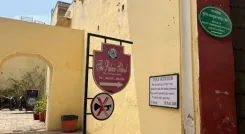Is Karnataka Cracking Down on Bike Taxis? Association Appeals to Rahul Gandhi

Synopsis
Key Takeaways
- Karnataka has initiated a crackdown on bike taxi services.
- Over one lakh riders face a livelihood crisis.
- Namma Bike Taxi Association is seeking intervention from political leaders.
- The crackdown follows a High Court ruling.
- Dialogue is essential for a sustainable solution.
Bengaluru, June 16 (NationPress) The Karnataka Transport and Police departments have initiated a stringent crackdown on bike taxi services in Bengaluru and other district headquarters this past Monday, following a directive from the High Court.
In response, the Namma Bike Taxi Association has reached out to the Leader of the Opposition, Rahul Gandhi, and Chief Minister Siddaramaiah, urgently requesting their intervention to lift the ban.
The correspondence emphasizes the livelihood crisis that could impact more than one lakh bike taxi riders across the state.
Notably, popular app-based aggregators have already scaled back their operations in Karnataka, now focusing solely on parcel deliveries.
This crackdown follows a decision from the Karnataka High Court last Friday, which dismissed a request to suspend a previous order from a single-judge bench that mandated the cessation of bike taxi services. The division bench, led by Acting Chief Justice V. Kameshwara Rao and Justice Sreenivas Harish Kumar, extended the deadline for ceasing operations to June 15 and scheduled further hearings for June 24.
The earlier ruling, issued on April 2 by Justice B. Shyam Prasad, stated that bike taxi aggregators cannot operate in Karnataka until the state formulates guidelines under Section 3 of the Motor Vehicles Act, 1988, and establishes the necessary regulations.
This decision arose from petitions submitted by various companies asking for additional time to wind down their services.
In its letter, the Namma Bike Taxi Association warned that the ban jeopardizes the livelihoods of over one lakh riders, many of whom are students, daily wage earners, and sole providers for their families.
“We ride through sun, rain, and traffic for 10-12 hours a day to support our families. This is not just supplemental income; it is our sole source of income,” the letter stated.
“Our humble request is simple—don’t ban us overnight. Engage with us. We seek a way forward that guarantees passenger safety, complies with regulations, and most importantly, allows our families to sustain themselves,” the letter further articulates.
The association criticized the Transport Department for abruptly cutting off riders' income instead of developing regulations for licensing, training, and insurance. They also referenced the state's previous withdrawal of the electric bike taxi initiative as an example of policy inconsistency.
Highlighting the potential socio-economic repercussions, the letter argued, “Karnataka has made significant strides for gig workers through social security measures, welfare boards, and insurance. However, this decision is driving us into a crisis.”
Furthermore, it stated that the ban not only impacts riders but also millions of commuters who depend on bike taxis for affordable, quick transportation, especially in areas poorly served by buses.
“We complete around 8 crore trips annually. Who will cater to these passengers now?” the letter implored.
The association urged the government to pursue dialogue rather than imposing bans, advocating for a solution that ensures both regulatory compliance and the protection of livelihoods.








